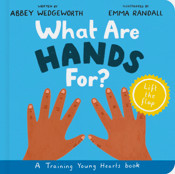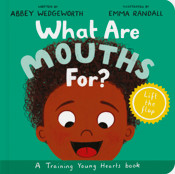
“When should I begin discipleship with my child?”
This is a question I receive often, and I always offer the same response, “You already are.”
The word discipleship comes from the Greek word “to teach.” And as the old saying goes, more is caught than taught. The way that our kids see and interact with the world is shaped by how they see us living. They learn to value what we assign value to with our time and money. The way that they view themselves is shaped by our care for them. The way they interact with others is shaped by our interactions with others.
Even if you don’t feel like you’re being intentional, you’re discipling your children. So the better question might be, “Since I already am discipling my child, how do I do that well? How do I make sure that I’m training them up in the love, grace, and truth of God?”
You can teach your kids Bible verses and catechism questions until you’re blue in the face, but if you are not devoting time to God’s word and being formed by it, you’re just being a hypocrite.
My children emulate their dad and me all day. Our work is their play. They mow the grass, unload the dishwasher, want to help in the kitchen, pretend they’re doing our hobbies. My kids also play church and pretend to read the Bible beside me in the morning. This affirms the reality that discipleship has already begun, and therefore points to the need for our own personal faithfulness.
The primary way to be a disciple-maker for Jesus—really the only way—is to be a disciple of Jesus yourself. You can teach your kids Bible verses and catechism questions until you’re blue in the face, but if you are not devoting time to God’s word and being formed by it, you’re just being a hypocrite. You can teach your children the Lord’s prayer, how to pray, and verses about prayer, but if prayer is not something that you do with them and for them, if it’s not a part of your family life, will they really see it as valuable or essential? You can teach them about repentance, reconciliation, and conflict resolution all day long, but if they never hear you apologize to them or others, if they listen to you vent about how wrong other people are, then are they really going to see humility, forgiveness, grace, and charity as qualities to cultivate as a Christ follower?
Parenting has as much to do with modeling as it does instructing (or correcting). To be honest, the thought of my sons imitating me is a little disconcerting. It always made me a little uncomfortable when Paul told the church at Corinth to "be imitators" of him (1 Corinthians 11:1). How arrogant, right? But the thing that Paul understood is that growth in grace happens as we watch and emulate more mature believers. And this is why the second part of his phrasing is so important: "Be imitators of me," he says "as I am of Christ."
Our primary calling as Christian parents is to remain faithful to Jesus, desiring to be with him, and by the power of the Holy Spirit becoming like him more and more.
Somehow, God uses the faithfulness of his fumbling followers to help those behind them learn what it means to live for him. This is his design for discipleship: not curriculum on life, but life on life. Our primary calling as Christian parents is to remain faithful to Jesus, desiring to be with him, and by the power of the Holy Spirit becoming like him more and more.
So yes, much of discipleship is informal—just living life alongside each other. But there is also a place for formal discipleship in the lives of our children. I recently read an Instagram post in which a woman advocated for introducing your child to God as a person instead of just pumping them full of information—but God reveals himself through his word, he speaks through his word, and so if we want to introduce our children to him, the Bible is the best place to start.
We memorize verses with our kids that help them to relate to God as their Creator and Father. It is in that context that we teach them his commands for their lives, loving instructions from the one who has the greatest right to give them as their Maker and the one who cares for them better than anyone else in their lives. We memorize verses with them that teach them how to relate to Jesus as their friend, mediator, and redeemer. We memorize verses with them that help them to see the Holy Spirit as a source of comfort, conviction, and help to fulfill all that God asks them to do. God’s word is the lens through which we help them to see God’s world with accuracy.
Kids have an uncanny ability to memorize with repetition, and they like it! It’s why they ask to listen to the same song on repeat, or read the same book over and over. To expose them to catechism questions that help shape their identity, or songs that help them hide God’s word in their hearts, isn’t pumping them full of information they aren’t ready for, it’s filling their hearts with treasures that they can mine as they grow in their faith. If we think it’s worthwhile to teach them their numbers, letters, and colors, we ought to teach them who God is, what he has done for them, and how he’d like them to use the lives he has given them.
Throughout the New Testament, we see Jesus meeting people where they are over and over. We ought to do the same with our closest, littlest neighbors as we seek to love them. I want my two-year-old to learn how to unload the dishwasher, but I’m not going to ask him to put away glassware on the top shelf. In the same way, it’s not realistic to ask him to listen to a 45 minute sermon, or maybe even a 10 minute story.
Meeting our children where they are requires considering the way that God designed them to develop. Of course we want them to grow in their ability to sit still and listen, but if we want them to love God and to get excited about the Bible, then we have to be careful not to cause them to associate spiritual things with negative experiences. We must be incredibly careful not to allow our relationships with our children to suffer in the name of formal discipleship.
As parents, one of the greatest privileges we have is to introduce our children to new things, and the most wonderful things we can introduce them to are the person, words, and work of Christ. So go enjoy that endeavor! Sing, dance, play, read, and learn alongside your child. It’s never too early, or too late, to begin teaching your child about Jesus.
For practical discipleship tools for toddlers and young kids, check out Abbey Wedgeworth’s series Training Young Hearts.

Practical, fun tool for parents raising toddlers. Encourages obedience motivated by God’s love and grace.

Practical, fun tool for parents raising toddlers. Encourages obedience motivated by God’s love and grace.